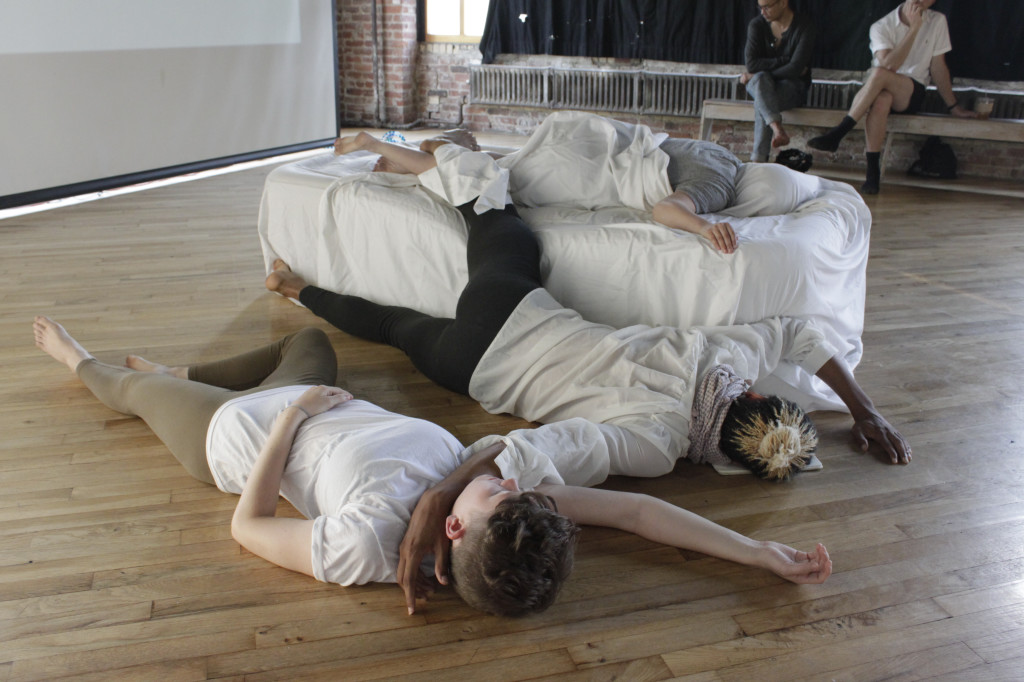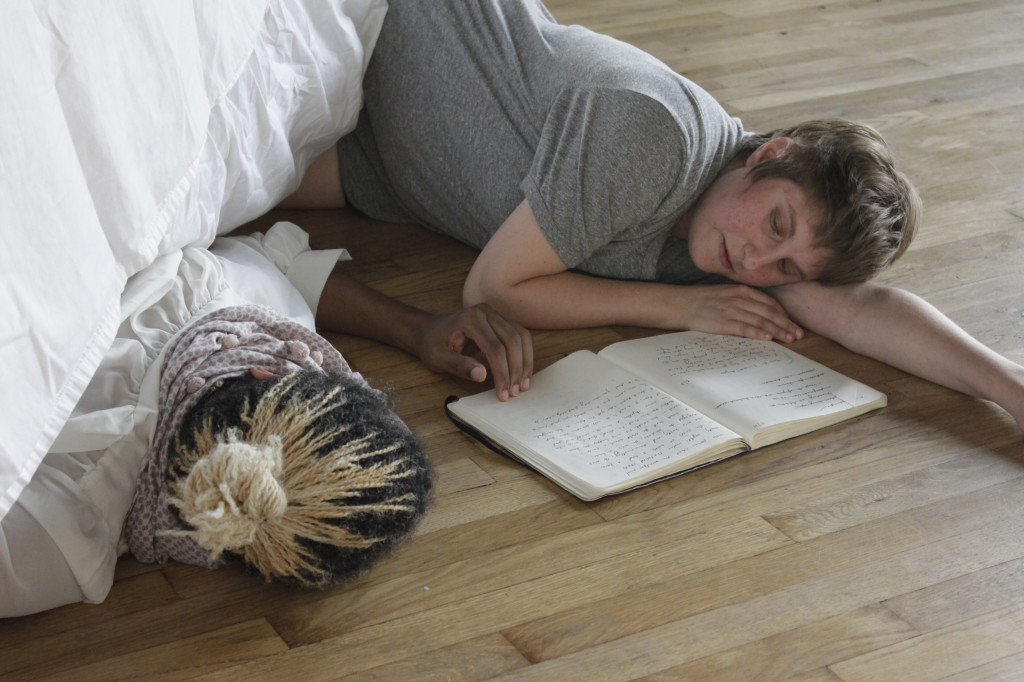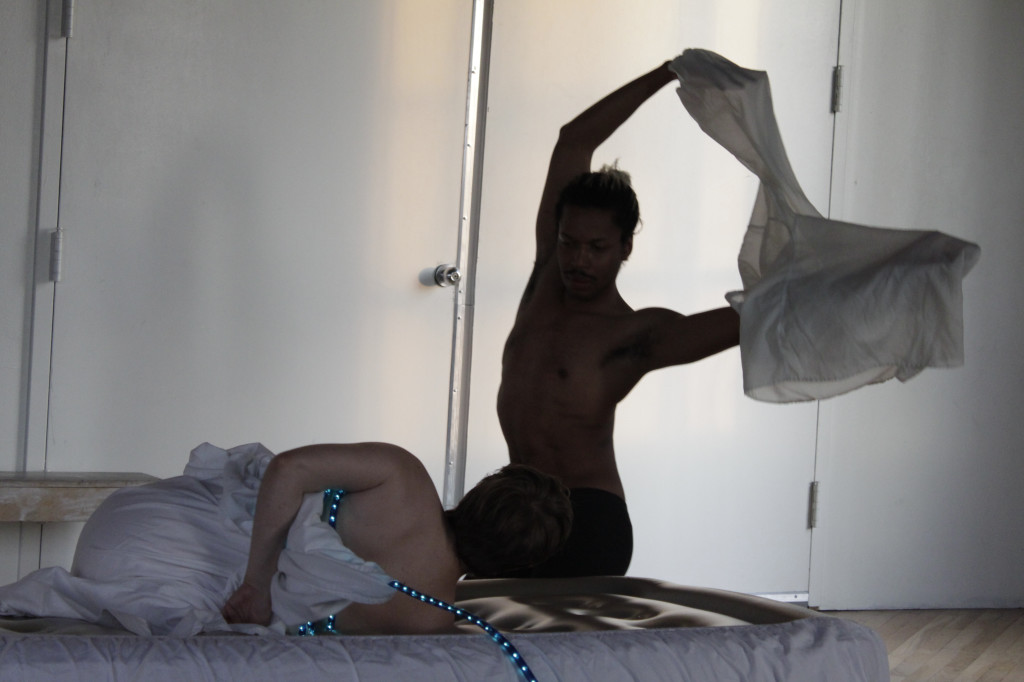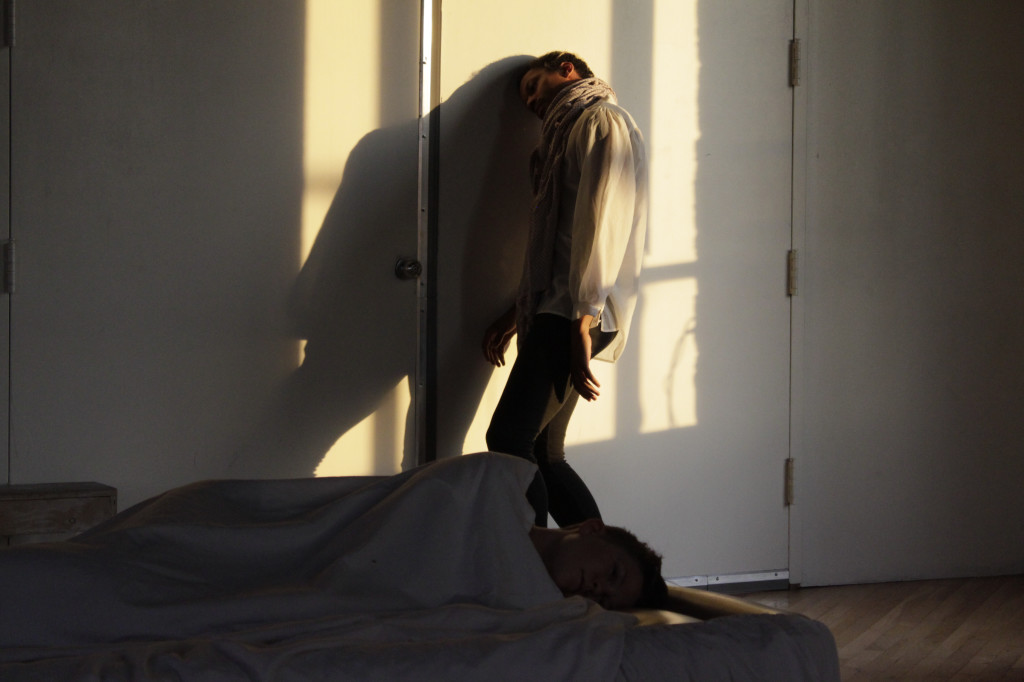Author | Sophie Sotsky | TYKE DANCE
Photography by Yasamin Ghanbari
Marissa Perel’s More Than Just a Piece of Sky
“Perel’s objection to the tradition of correlating queerness with failure and negativity is subtly stated in her poetic and forceful title: More Than Just a Piece of Sky.”
There has been and continues to be a tendency in the queer community, and in modern philosophical disciplines that critically treat queer theory, to see queerness as a negativity —as a lack. It is this tradition, and this widely-accepted viewpoint, that Marissa Perel’s More Than Just a Piece of Sky critiques.
In well-respected and widely-read academic texts such as J.Jack Halberstam’s The Queer Art of Failure, what is really proposed is queerness as an alternative. Yet what is linguistically coded is queerness as a failure. Halberstam writes about queerness as alternative to the norms — to the classical cultural myths — of capitalism, heteronormativity, institutionalized knowledge and codified academic methodologies. “In an age when our formula for success has become fused with making money, failure might offer us a critique of capitalism,” says Halberstam. “And in an era when the only successful relationship is seen as one that lasts forever and is recognizable to the state, failure might offer us an avenue to alternative intimacies.” 1
This coding of “alternativeness” as a failure is enormously problematic, and smacks of the multitude of psychological, philosophical and aesthetic theorizing that has for decades proposed femininity as a lack. (For example, Freudian psychology, conflated by many of his predecessors, which designates the female genitals as “missing.”)2
Perel’s objection to the tradition of correlating queerness with failure and negativity is subtly stated in her poetic and forceful title: More Than Just a Piece of Sky.
 More Than Just a Piece of Sky is based around the tale of Yentl, originally a short story by Jewish-American author Isaac Bashevis Singer. In Singer’s Yentl the Yeshiva Boy, a young Jewish girl defies tradition, combats her rabbi father, questions Jewish law and theology, cuts her hair short, goes by “Anshel” and dresses like a man in order to pursue Talmudic study. At the end of the 1983 movie adaptation of Yentl, co-written, co-produced directed by and starring Barbra Streisand, Yentl fails to pass for a boy, and ultimately leaves town on a ship. The song that plays in the film’s closing moments as Yentl is leaving on that ship is called “A Piece Of Sky.” And it is this ending scene — of failure and defeat — to which the title of Perel’s work refers. “I made the title of the show More Than Just a Piece of Sky coming from that departure point,” Perel told me. “—The idea that being queer is more than failing… and letting people down and departing.”
More Than Just a Piece of Sky is based around the tale of Yentl, originally a short story by Jewish-American author Isaac Bashevis Singer. In Singer’s Yentl the Yeshiva Boy, a young Jewish girl defies tradition, combats her rabbi father, questions Jewish law and theology, cuts her hair short, goes by “Anshel” and dresses like a man in order to pursue Talmudic study. At the end of the 1983 movie adaptation of Yentl, co-written, co-produced directed by and starring Barbra Streisand, Yentl fails to pass for a boy, and ultimately leaves town on a ship. The song that plays in the film’s closing moments as Yentl is leaving on that ship is called “A Piece Of Sky.” And it is this ending scene — of failure and defeat — to which the title of Perel’s work refers. “I made the title of the show More Than Just a Piece of Sky coming from that departure point,” Perel told me. “—The idea that being queer is more than failing… and letting people down and departing.”
Perel was inspired by this story for numerous reasons. “I was attracted to Yentl because Yentl defies everything and survives,” Perel told me. Yentl’s agency, defiance, and spirituality all appeal to Perel. In fact, for Perel, Yentl’s steadfast beliefs, bravery and refusal to remain within societal constraints are — divine. “On one hand, they’re totally contrary to what’s holy and then on the other hand… they’re holier.”
It is clear that close and intimate collaborations shaped this work. And reciprocally each collaborator’s contribution uniquely shapes the intimacy that factors as a major theme in this work.
Set designer John Taylor’s subtle architecture includes a bed mounted on a glowing platform, suggesting the divinity of the private sphere. Lighting designer Elliott Jenetopulos lends dusky tones, the feeling of privacy, the sensation of a bedroom, and the tension between internality and externality.
 Performers Jumatatu Poe and Lindsay Reuter have enmeshed themselves thoroughly in this process, contributing their own subjectivities but also wholly taking on Perel’s in order to realize her vision. “I feel like they’re a part of me in this performance,” said Perel.
Performers Jumatatu Poe and Lindsay Reuter have enmeshed themselves thoroughly in this process, contributing their own subjectivities but also wholly taking on Perel’s in order to realize her vision. “I feel like they’re a part of me in this performance,” said Perel.
Of course, The Chocolate Factory Theater itself already evokes intimacy, and especially for Perel, whose first solo show, Burden, was produced there in 2006. Returning to this venue, which was just shy of ‘underground’ in 2006 and has now grown into a crucial pillar of the experimental scene, is particularly poignant.
More Than Just a Piece of Sky explores intimacy, internality, melancholy, longing, secrecy and difference.
Importantly, this work heavily features improvisation. Beyond that, Perel aspires to “propose an idea of improvisation as a queer methodology for art making.” We focus far too much, she believes, on craft and on form, but not enough on the identities of the makers themselves, when we consider a work’s formal elements. Perel believes the identity of the maker themself is already deeply embedded within those formal qualities. “I propose looking at identity as a way of making things,” she said. “As a queer subject and as a disabled subject… it totally influences and shapes how I make.”
When Perel described to me why improvisation is a particularly queer methodology, she could just have easily have been describing to me why dance performance itself is particularly (and perhaps uniquely) well-suited to the subject matter of queerness:
“It’s liminal and ephemeral and it exists in between what just happened and what is going to happen and that’s where its energy is. It’s not about making it set and it’s not about it being one-dimensional, and it’s not even always about it being clear.”
For Perel, though, unclearness does not designate a lack. The ambiguity and liminality of improvisational space is neither a lack of success nor a dearth of decision. It isn’t setting sail and leaving town — escape as alternative. Perel’s improvisational space is one of positivity and possibility. “This piece is part of research,” said Perel, “on improvisation as queer space— improvisation as a potential space.” Perel proposes the possibility of unknowingness as a positivity — and a distinctly queer one. “That in-between potentiality thing,” she said, “to me … is the thing.”
More Than Just A Piece Of Sky is presented as part of the Queer New York International Arts Festival. It runs at The Chocolate Factory Theater Wednesday September 17th through Saturday, September 20th at 8pm.
The Chocolate Factory Theater is located at 5-49 49th Avenue, Long Island City, Queens; 866-811-4111, chocolatefactorytheater.org.
—–
1Halberstam, Judith. The Queer Art of Failure. Durham, NC: Duke University Press, 2011. Print.
2Grosz, Elizabeth. Volatile Bodies: Towards a Corporeal Feminism. Bloomington, IN.: Indiana University Press, 1994. Print.


